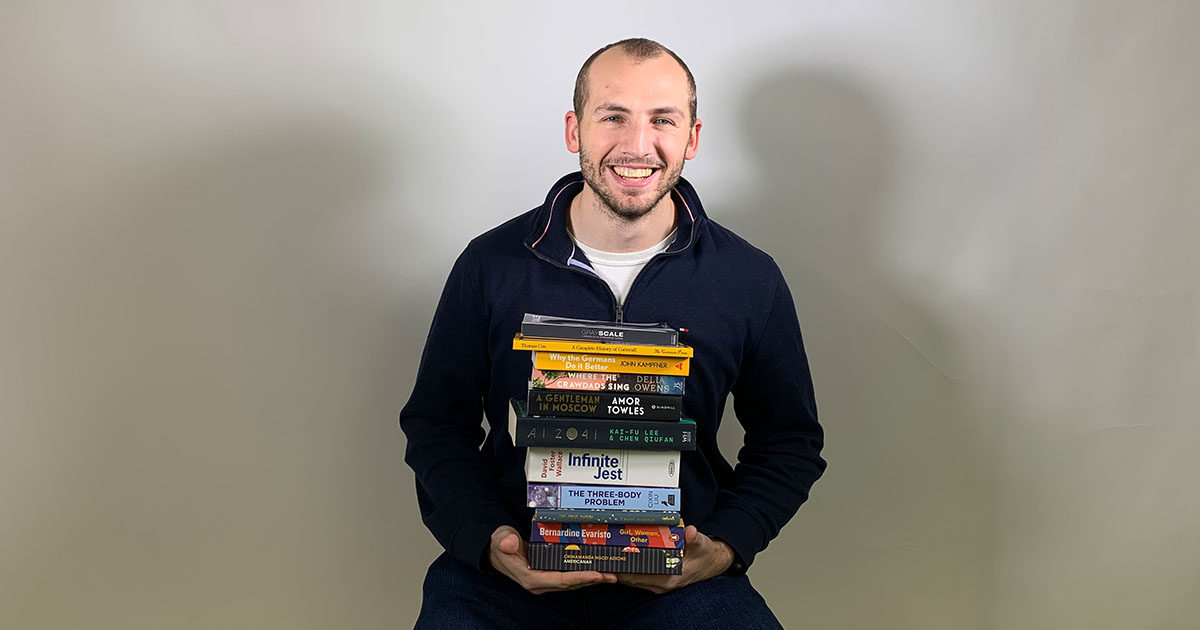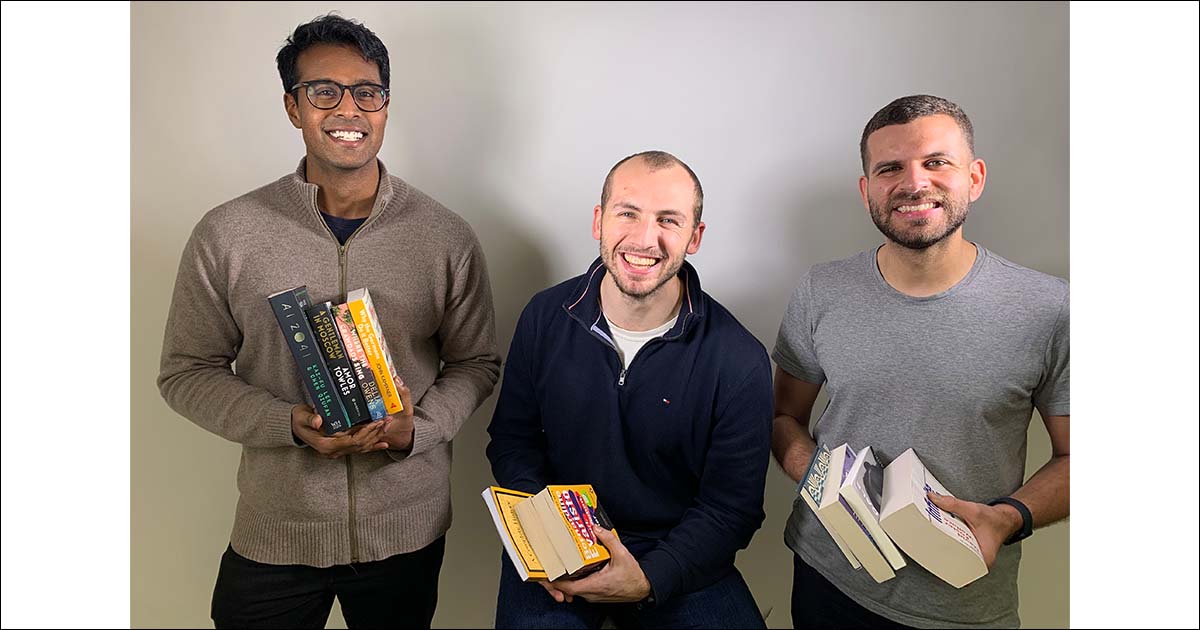Reread Profile

Last Updated: By TRUiC Team
Through the power of AI and machine learning, Reread provides important insights for authors to write and publish best-selling books.
Interview With Oliver Rodwell
Describe your product or service:
“Reread is an AI platform helping authors write bestselling books. Using text mining and machine learning, we have deconstructed thousands of books to identify the makings of a bestseller — using this insight, we help authors improve their work. However, we're not stopping there. Our vision is to branch out to different types of writing, from essays to blog posts. We want to take high-performing content, analyse it, learn from it, and give writers the breakthrough insights they need to write killer pieces.”
Describe your company values and mission:
“Our mission is: Inspire action in writers to be all they can be.
As a team we have five values:
Radical Candour
We say what needs to be said but with empathy
Integrity
Do what’s right over what’s easy, and [we] do what we say we’ll do
Ingenuity
Think outside the box
Trust
Make decisions in the company’s best interest
Results Oriented
Never follow a process without reviewing its benefits and relevance.”
How are you funded? I.e. type of funding, number of funding rounds, total funding amount.
“We've currently received £50,000 [$68,000 USD] of grant funding, which we have used combined with our own personal finances to launch the business and hire our first team members.”
How big is your team? Tell us a little about them (I.e. co-founders, freelancers, etc.)
“We currently have a team of five. This is made up of the three co-founders and two contract software developers.”
How did you come up with and validate your startup idea? Tell us the story!
“Our idea for Reread came from Mo's personal experience. As a published author he's been on the journey nearly every author takes of learning the writing process and exploring the tools that are available to help make it easier. This gave him an in-depth understanding of the challenges authors face. The key challenge we identified from interviewing Mo was the limited access to experienced developmental editors (editors focused on improving the story holistically). Experienced developmental editors are hard to find as they combine an in-depth understanding of literature with up-to-date knowledge of best-selling books (they're often reading 30-40 books a week!). In comparison, copy editors (editors focused on spelling, punctuation, and grammar) are abundant, in both human and AI form (Grammarly, Prowritingaid, Autocrit). This challenge causes a serious problem for authors as it stops them [from] reaching their full potential, ultimately meaning they don't sell as many copies as they could, stopping authors from being able to pursue a career as an author.
To validate this problem, we began interviewing authors, confirming that they too had the same pain points. We also discovered several other contributing pain points, such as the high cost to publish a book, the traditional publishing model not being fit for purpose, and existing services not being able to meet rising author demand. Following on from this, we began interviewing editors, being fortunate enough to be linked into the writing community in Falmouth, we were able to interview editors from prolific publishing houses such as Bloomsbury and Simon & Schuster. It was during these interviews that we discovered our solution. The editors we spoke to relied on their years of experience which culminated in 'gut feelings;' however, digging deeper into this we discovered that these 'gut feelings' were based on learnt data points. We knew from this that if we could understand those data points, we could automate the feedback.”
How did you come up with your startup's name? Did you have other names you considered?
“We considered a number of names but Reread stuck due to it being short [and] relevant, and we could get the great domain name reread.ai!”
Did you always want to start your own business? What made you want to become an entrepreneur?
“All three of us have discussed this at length and realised having a passion to set up a business is something we've all had from an early age. We all have entrepreneurs in our families — this has exposed us to both the reward you get from starting your own venture [and] the dedication required. Through these experiences, we've also seen entrepreneurship as a force for good. The particular example I (Oliver) can relate to is being in a position to pay employees fairly and give back to the community, there's very few other positions in life that give you the agency to make these kinds of decisions. It's fair to say we have been inspired to become entrepreneurs and hope to inspire future entrepreneurs.”
Feeling inspired? Learn how to launch your company with our guide on how to start a startup.
Did you encounter any roadblocks when launching your startup? If so, what were they and what did you do to solve them?
“Hiring has definitely been our most fundamental challenge. In the current environment, developers are in high demand, which compounded by our location in Cornwall resulted in us really struggling to find developers. In the end, we had to compromise, hiring much more junior developers than we'd initially intended. However, it's been a positive experience for us as it's both given us the opportunity to learn and hire some really promising developers.”
Who is your target market? How did you establish the right market for your startup?
“Our current target market is independent authors. We knew from the start this was the right market for us, as they are willing to try new services to improve their work and were finding the existing services weren't meeting their needs. We validated this through conducting interviews with different types of authors and by putting ourselves in the authors’ shoes.”
What's your marketing strategy?
“Right now we're focusing on push marketing targeted at authors currently writing their books. This is centred around the channels where authors are congregating and discussing writing. We're also looking to use referral marketing to create virality in our user growth.”
How did you acquire your first 100 customers?
“Our first 100 customers were key to understanding how authors engaged with our platform. We personally reached out to every one of them through social channels, explained the value proposition, and listened to their feedback. This process has been fundamental to our product’s success.”
What are the key customer metrics / unit economics / KPIs you pay attention to to monitor the health of your business?
“We currently track user growth, user retention, user satisfaction, revenue, and bestsellers coming from our platform (that's our ultimate metric of success)!”
What's your favorite startup book and podcast?
“Priyen's the big reader among us, so I'll take his opinion on the books over anyone's — he always recommends ‘Originals’ by Adam Grant to every startup founder we meet. I'd be remiss if I didn't mention Mo's book ‘Grayscale,’ for leadership it's second to none. In terms of podcasts, I'd recommend the Blazon Let's Talk Startups podcast, but I may be biased as we're on it!”
Is there a tool, app, or resource that you swear by to help run your startup?
“Clickup - it's how we organise our working lives.”
What is something that surprised you about entrepreneurship?
“You get so much conflicting advice from different successful entrepreneurs, it's surprising that there seems to be very little consensus on how to be successful.”
How do you achieve work/life balance as a founder?
“Living within just a few miles of each other, it would be really easy as founders to work 24/7. However, we recognised that early on and established strong routines to counter it. In practice, this means playing a sport together bi-weekly (usually squash) and trying something new every month — this month, it's axe throwing! We're also all living away from our respective families and partners, so [we] really respect each other's time-off when travelling home to see them.”
What is a strategy you use to stay productive and focused?
“I set myself clearly obtainable goals that I can reach throughout the day. It's always easier to stay focused when the end is in sight.”
Did you have to develop any habits that helped lead you to success? If so, what are they?
“The habit we picked up early was regularly reviewing feedback. As the person engaging with customers the most, I collect the feedback and share it with the team each morning, good or bad.”
What was your first job and what did it teach you?
“My first job was restocking fruit and vegetables in a local supermarket. This taught me how to engage with customers and understand their needs. I implore everyone to work in a customer-facing world before entering the world of business. An 'on the ground' understanding is invaluable.”
Recommended:
- Keep up with more startup companies by visiting our list of the top startups to watch.
- Hear startup stories from real founders on the Startup Savants podcast.
- Form your own startup by reading our review of the best online incorporation services.
Tell Us Your Startup Story
Are you a startup founder and want to share your entrepreneurial journey with our readers? Click below to contact us today!
More on Reread

Insights From the Founder of AI Startup Reread
We were fortunate enough to hear some valuable insights during our interview with Oliver Rodwell of Reread that will inspire, motivate, and teach aspiring and established entrepreneurs alike.

5 Ways to Support AI Startup Reread
We asked Oliver Rodwell, founder of Reread, to share the most impactful ways to support their startup, and this is what they had to say.


